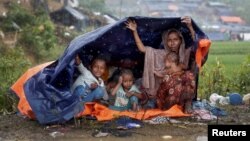Bangladeshi authorities took steps Sunday to restrict the movement of Muslim Rohingya refugees fleeing violence in Myanmar into crowded border camps and started immunizing tens of thousands of children against diseases.
Bangladesh has been overwhelmed with more than 400,000 Rohingya who fled their homes in the last three weeks amid a crisis the U.N. describes as ethnic cleansing. Prime Minister Sheikh Hasina, who lambasted Myanmar for atrocities during a visit to border camps last week, left Dhaka to address the annual U.N. gathering in New York.
150,000 children to immunize
Abdus Salam, the top government administrator in the Cox's Bazar district hospital, said that about 150,000 children will be immunized over seven days for measles, rubella and polio. U.N. says there are some 240,000 children living in dire conditions.
“There are a lot of weak and malnourished children among the new arrivals,” UNICEF representative in Bangladesh, Edouard Beigbeder, said in an email. “If proper preventive measures are not taken, highly infectious diseases, especially measles, could even cause an outbreak.”
Two pre-existing Rohingya camps were beyond capacity and the new arrivals were staying in schools or huddling in makeshift settlements with no toilets along roadsides and in open fields.
On the first day of the immunization campaign Saturday, doctors treated about 9,000 children for rubella and nearly 5,000 for polio. Salam said that basic and emergency health services were being provided through 36 medical camps with focus on children and women.
“Many of them are suffering from diarrhea, dehydration and skin diseases. They are coming to hospitals with such complications,” he said.
As the weather fluctuates in Cox's Bazar between rains and sunny and humid days, many children are suffering from flu and risk pneumonia, he said.
Police keep refugees close
Police were checking vehicles to prevent the Rohingya from spreading to nearby towns in an attempt to control a chaotic situation.
“There is an instruction from the prime minister that we must treat Rohingya Muslims maintaining human rights,” said A.K.M. Iqbal Hossain, a police superintendent. “As many private and social organizations are coming and distributing relief, sometimes chaos breaks out ... You understand the scale of a humanitarian crisis here, it's very difficult to keep order, but we are doing so.”
The refugees began pouring from Myanmar's Rakhine state after a Rohingya insurgent group launched attacks on security posts Aug. 25, prompting Myanmar's military to launch “clearance operations” to root out the rebels. Those fleeing have described indiscriminate attacks by security forces and Buddhist mobs.




